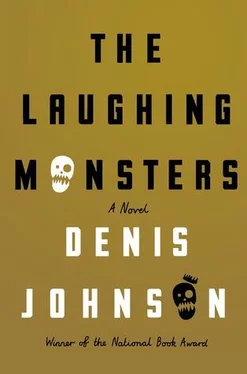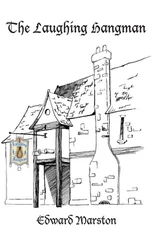I trudged for five hours, covering in that interval only a few miles. The dawn had begun — as always this near the equator very gradually, and even doubtfully — before I spied any huts among the trees.
I reached a slick soft spot I couldn’t skirt unless I ranged far into the wood. I sidled left along its edge and came to a sucking, lethal-looking red-and-yellow mudhole sprouting dead limbs around its border. In such a pit anything might be drowned. I shrugged off the pack and opened it at my feet. I set aside my papers and cash, and the map, and the water. I gripped one strap and spun myself to get the pack whirling and let it fly ten meters. It slapped the surface, skidded, rolled slowly under.
My Timex said it was 6:17 on the twenty-sixth of October. Five days, nine hours left in which to find my way to Freetown. Plus an hour I’d pick up changing time zones. I unstrapped the watch from my wrist and pitched it underhanded into the muck.
Five thousand kilometers. One hundred thirty hours.
I drank down a liter of water as I stood there, tossed the bottle, kept the other, which wouldn’t stay with me much longer. While the pack sank with anything metal — penlight, camp knife, phony kilos, the lot — I removed my shirt and used it as a bindle for the rest. I thought about tossing away my belt with its suspicious metal buckle, considered also the buttons on my shirt and trousers, realized I might as well go naked — what certainty would it bring? There’s always something more to be rid of. Something inside.
* * *
I wondered about Michael. I expected him to turn up at my side having lingered in the area all this time, watching for some sign of me or of Davidia. As soon as I thought of him, there he was, Michael, crouched at the base of one of these tall trees just ahead — but it wasn’t Michael. Only a termite berm. As the day came on it revealed many more such berms feeding on the eucalyptus, and I thought I saw blurry figures or ghosts crouched in the grove, watching me, and soon the woods were full, indeed, of people moving among the trees and poking slender sticks into the mounds, harvesting the white ants. I was joined on the way now by dozens of mud-spattered, stately women balancing baskets on their heads, taking the insects to the market. None of them spoke. They had the manner of ghosts. Possibly one of them had sprung from the corpse of the woman we’d struck down in Uganda. But their feet padded on the clay. I heard them breathing.
I followed them out of the woods and into Darba, a town without electric light, without even useless wires, just old power poles broken at the tops like huge dead stalks. The place materialized around us in a haze of cook-smoke, a city of sturdy French colonial buildings without panes in the windows or doors in the doorways, concrete husks into which people had moved their animals while they made shanties of twig and adobe for themselves in the yards.
I stopped at a café, really a tent. I gave the barman a twenty-dollar bill and he left me sleeping on my face at his only table while his small daughter looked after the establishment.
I woke when a guy came in flying on what looked like the greatest drug ever made. He was speaking in tongues, his feet didn’t touch the floor, he was just being lugged around by his smile; it turned out he was merely drunk on a few baggies’ worth of “spirits” branded, in this case, as Elephant Train.
I bought him another and another, and as many for myself. When I asked him if he spoke English, he said, “Super English.”
“Where is Newada Mountain?”
“You need to go La Dolce.”
“How do I find La Dolce?”
“Go to Newada Mountain.”
“No. No. Ou est La Dolce?”
“La Dolce!” I heard the two Italian words, though he might have said Ladoolchee.
“Is La Dolce near Newada Mountain?”
“She is the mother of Newada Mountain.”
“A person? A woman? Une personne? Une femme?”
“Yes. The mother. Oui. La mère. Oui.”
Elephant Train. I spread out my Congo map, and together we searched for Newada Mountain as we bit into many packets and sucked down the contents, but the map got smaller and Congo grew larger, and soon we were lost.
The barman returned and presented me with a pair of slip-on jogging shoes, blue in color, a pair of black denims called El Gaucho, and a yellow T-shirt with a woman’s brown face on it. Who is the woman? I said, and he said, Très jolie! I said, Oui oui. He gave me my change in Ugandan shillings. I said, No Congo francs? and he said, Le franc? — c’est merde.
When I asked about Newada Mountain he said, It’s there, pointing north, but I don’t know how to get there. Go to the coffin maker. He’s going to Newada. He’s next to the church.
Yes, I see the church.
He’s going to Newada Mountain. Follow the coffin maker.
The clock on the post stretched its hands out sideways, nine-fifteen. I’d walked for five hours, slept for one. Spent another getting drunk. Out back of the café I found a dry spot of earth to stand on among the puddles, and got myself into the new wardrobe. The jeans and T-shirt sagged quite a lot; the blue shoes fit perfectly over my grimy socks.
* * *
Behind the Église du Christ I found a man, a very small one, perhaps of the Mbuti, one of the Pygmy groups, dressed in a sports shirt and clean trousers and shiny plastic sandals. He stood with his hands on a green bicycle, rolling it backward and forward as if to check its worthiness. I said, “Are you the coffin maker?” He didn’t understand. I tried to remember the French word for coffin but I never knew it in the first place. Somebody called to him, he abandoned me for a fool, and I followed him as he walked his bike along the crumbling tarmac street.
On sawhorses out front of his lean-to rested five bright purple coffins, two of them, I’m afraid, quite short. These were the two he was concerned with. He parked his bike’s rear tire on a notched block to steady it and mounted both coffins — equal in length, about a meter — sideways behind the seat and fastened them down with black rubber straps, which he tightened and yanked and tightened again.
He high-stepped over the bar of his conveyance and straddled it while he rolled it free of the block and set his feet on the pedals. For a moment he stood in the air, then descended as he produced a forward motion. He knew I was watching. I don’t think he liked it.
I followed some distance behind him, out of the town and into a small rain, then under a hot blue sky. The tarmac ended in a fog of red dust out of which the vast faces of speeding lorries exploded one after another, saying I AM LOST — TOUT AU BOUT — REGRETTE RIEN — coming within half an inch of touching us, as if some superstition required it. I lost him in the choking clouds until he left the highway for a sidetrack, and I glimpsed a bit of purple a quarter mile off to my right.
For some time I floated along like a marionette. I had no reason for believing these two small coffins were headed for Newada Mountain. We had the sun traveling toward our left, and therefore, it seemed, this track took us north, and north felt reason enough to be doing anything — that is, some particle of my memory put Newada to the north of where I’d first entered Congo with Michael and Davidia.
I had no problem keeping up, as he stopped often to get his strength. On the upward slopes he got off and walked his bike, and I pulled ahead of him. I never said hello or the like. My shoes held up, though my socks were falling to pieces. No blisters. The bottoms of my heels felt raw, but only slightly.
About three hours along, many kilometers from the highway, the green bike’s rear tire went flat — perhaps owing to some sabotage, as the puncture happened in front of an establishment consisting of a bench and a bicycle pump, open for business, which business was tire repair. The repairman pried the tire loose from its rim, pulled out the inner tube, and went about patching it with a remnant cut from another inner tube.
Читать дальше












